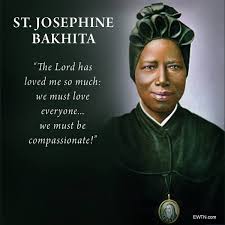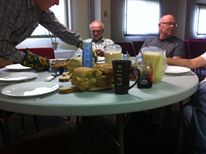


Today is the annual World Day of Prayer, Reflection and Action Against Human Trafficking. The day of prayer is celebrated in the Catholic Church worldwide every Feb. 8, the feast of African-born St. Josephine Bakhita, a Sudanese-Italian Canossian religious sister active in Italy for 45 years, after having been a slave in Sudan. In 2000 she was declared a saint by the Catholic Church. In 2015, Pope Francis designated Feb. 8 as St. Josephine’s feast day, and as the World Day of Prayer, Reflection and Action Against Human Trafficking. This year will be the sixth iteration. She is also the patron saint of Sudan.
There will be a “Together against trafficking” march Feb. 9, which will start at 10 a.m. from Castel Sant’Angelo and end in St. Peter’s Square at 12 noon local time.
St. Josephine Bakhita was born in 1869 in the west Sudanese village of Olgossa in the Darfur region of Sudan. She was a member of the Daju people and her uncle was a tribal chief. Due to her family lineage, she grew up happy and relatively prosperous, saying that as a child, she did not know suffering (https://www.catholic.org/saints/saint.php?saint_id=5601).
“Historians believe that sometime in February 1877, Josephine was kidnapped by Arab slave traders,” reports Catholic Online, a project of Your Catholic Voice Foundation, a not-for-profit corporation, based in Bakersfield California..
“Although she was just a child, she was forced to walk barefoot over 600 miles to a slave market in El Obeid. She was bought and sold at least twice during the gruelling journey.
“For the next 12 years she would be bought, sold and given away over a dozen times. She spent so much time in captivity that she forgot her original name.
“As a slave, her experiences varied from fair treatment to cruel. Her first owner, a wealthy Arab, gave her to his daughters as a maid. The assignment was easy until she offended her owner’s son, possibly for the crime of breaking a vase. As punishment, she was beaten so severely she was incapacitated for a month. After that, she was sold.
“One of her owners was a Turkish general who gave her to his wife and mother-in-law who both beat her daily. Josephine wrote that as soon as one wound would heal, they would inflict another.
“She told about how the general’s wife ordered her to be scarred. As her mistress watched, ready with a whip, another woman drew patterns on her skin with flour, then cut into her flesh with a blade. She rubbed the wounds with salt to make the scars permanent. She would suffer a total of 114 scars from this abuse.
“In 1883, the Turkish general sold her to the Italian Vice Consul, Callisto Legani. He was a much kinder master and he did not beat her. When it was time for him to return to Italy, she begged to be taken with him, and he agreed.
“After a long and dangerous journey across Sudan, the Red Sea, and the Mediterranean, they arrived in Italy. She was given away to another family as a gift and she served them as a nanny.
“Her new family also had dealings in Sudan had when her mistress decided to travel to Sudan without Josephine, she placed her in the custody of the Canossian Sisters in Venice.
“While she was in the custody of the sisters, she came to learn about God. According to Josephine, she had always known about God, who created all things, but she did not know who He was. The sisters answered her questions. She was deeply moved by her time with the sisters and discerned a call to follow Christ.
“When her mistress returned from Sudan, Josephine refused to leave. Her mistress spent three days trying to persuade her to leave the sisters, but Josephine remained steadfast. This caused the superior of the institute for baptismal candidates among the sisters to complain to Italian authorities on Josephine’s behalf.
“The case went to court, and the court found that slavery had been outlawed in Sudan before Josephine was born, so she could not be lawfully made slave. She was declared free.
“For the first time in her life, Josephine was free and could choose what to do with her life. She chose to remain with the Canossian Sisters.
“She was baptized on Jan. 9, 1890 and took the name Josephine Margaret and Fortunata. (Fortunata is the Latin translation for her Arabic name, Bakhita).” St. Josephine professed her vows as a Canossian Sister on Dec. 8, 1896. She died on Feb. 8, 1947.
“Pope-emeritus Benedict XVI, in his 2007 Encyclical Letter Spe Salvi, explained, “she [St. Josephine] came to know that this Lord even knew her, that he had created her – that he actually loved her. She too was loved, and by none other than the supreme ‘Paron’, before whom all other masters are themselves no more than lowly servants. She was known and loved and she was awaited. What is more, this master had himself accepted the destiny of being flogged and now he was waiting for her ‘at the Father’s right hand’. Now she had ‘hope’ – no longer simply the modest hope of finding masters who would be less cruel, but the great hope: ‘I am definitively loved and whatever happens to me – am awaited by this Love. And so my life is good.’ Through the knowledge of this hope she was ‘redeemed’, no longer a slave, but a free child of God.” (Spe Salvi, §3).
Francesca Sabatinelli, of Vatican News, the information system of the Holy See created in June 2015 with the publication of a Motu Proprio by Pope Francis, announcing the creation of a new Dicastery of the Roman Curia: the Vatican Secretariat for Communication, reported today the “numbers paint a grim picture; around the world there are over 40 million victims of modern slavery of which 70 per cent are women, while about 20 per cent are minors.”
Research developed in 2017 by the United Nation’s International Labour Organization (ILO) and the Walk Free Foundation, in partnership with the United Nation’s International Organization for Migration (IOM) found that of the more than “40 million people around the world [who] were victims of modern slavery in 2016 … The research showed that women and girls are disproportionately affected by modern slavery, accounting for almost 29 million, or 71 per cent of the overall total,” notes the Diocese of Parramatta in Australia’s New South Wales.
The Catholic Church is joined in speaking out against the evil of human trafficking, by many others, both religious and secular.
The True Story of Canadian Human Trafficking, published in June 2018, was written by my friend Paul Boge, a talented Mennonite Brethren evangelical Christian award-winning book author from Winnipeg. The book, published by Larry Willard, of Castle Quay Books in Pickering, Ont., won three awards last June at the Word Guild annual awards, honouring the best of Canadian Christian writing from 2018. The book won awards in the general market “Life Stories” category, received the Debra Fieguth Social Justice Award and also won the Grace Irwin Award for best book of 2019. N.J. Lindquist and Wendy Elaine Nelles founded the Word Guild in 2002. In 2008, the Word Guild merged with Christian Info Canada (CIC), a registered not-for-profit charitable organization.
Said Boge at the awards last June: “I dedicate the awards to all the survivors of human trafficking and to the victims who need to be rescued. Thank you Joy Smith and all the survivors who helped me with this book. Thank you Larry Norman Willard for publishing the book. Thank you Steve Bell and all the endorsers the book. Thank you Melissa McEachern and Lorie Hartshorn for all your promotion of the book. Thank you Joel Oosterman for your help and support. And thank you to all my friends and family for supporting this work … All award money will be donated to the Joy Smith Foundation to raise awareness about human trafficking in Canada and to rescue victims. For more information you can visit http://www.joysmithfoundation.com.
Boge went onto say, “Human trafficking is happening in every city in Canada. Youth from all backgrounds are at risk. Ninety per cent of all victims of human trafficking in Canada are born and raised in Canada. May God continue to raise up people to fight human trafficking.”
It was little more than four years ago in October 2015, an emergency room doctor in the United States reported finding a small RFID (radio frequency identification) chip, the size of a grain of rice, implanted under the skin of a human trafficking victim he was treating, after getting a triage note that said, “I have a tracker in me.” Each RFID chip is encased in a small capsule, which also contains a copper antenna coil and a capacitor. The chip stores a unique binary number that is transmitted to the scanner.
Human trafficking, while an often hidden problem, is in reality a scourge across a wide spectrum. “The hospitality industry is highly vulnerable to human traffickers especially when it comes to child sexual exploitation and forced prostitution, forced criminality, domestic servitude,” says the EHL Swiss School of Tourism & Hospitality, based in Lausanne, Switzerland.
Where I have worked for the last five years almost at the Quality Inn & Suites in Thompson, Manitoba, front desk employees and other management and staff receive training such as “DoesYourHotelKnow,” an awareness campaign by ECPAT-USA (formerly End Child Prostitution and Trafficking, based in Bangkok founded in 1990) that alerts hotels and travellers alike to educate themselves about the signs of sex trafficking, with a call to action (https://www.youtube.com/watch?time_continue=10&v=KllVVJ4seBA&feature=emb_logo).
You can also follow me on Twitter at: https://twitter.com/jwbarker22

